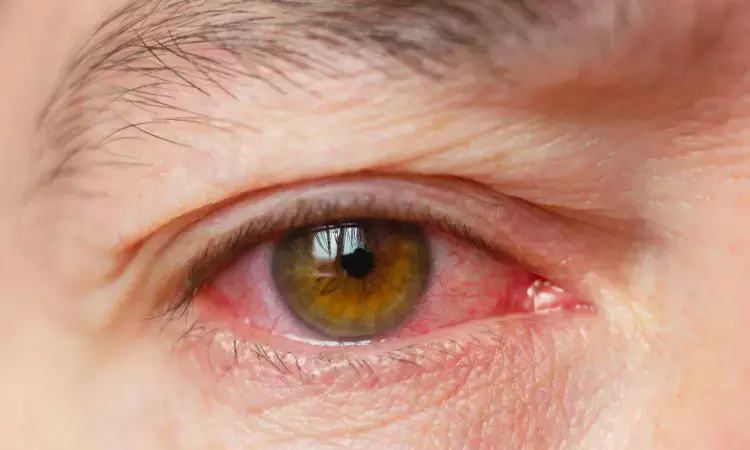- Home
- Medical news & Guidelines
- Anesthesiology
- Cardiology and CTVS
- Critical Care
- Dentistry
- Dermatology
- Diabetes and Endocrinology
- ENT
- Gastroenterology
- Medicine
- Nephrology
- Neurology
- Obstretics-Gynaecology
- Oncology
- Ophthalmology
- Orthopaedics
- Pediatrics-Neonatology
- Psychiatry
- Pulmonology
- Radiology
- Surgery
- Urology
- Laboratory Medicine
- Diet
- Nursing
- Paramedical
- Physiotherapy
- Health news
- Fact Check
- Bone Health Fact Check
- Brain Health Fact Check
- Cancer Related Fact Check
- Child Care Fact Check
- Dental and oral health fact check
- Diabetes and metabolic health fact check
- Diet and Nutrition Fact Check
- Eye and ENT Care Fact Check
- Fitness fact check
- Gut health fact check
- Heart health fact check
- Kidney health fact check
- Medical education fact check
- Men's health fact check
- Respiratory fact check
- Skin and hair care fact check
- Vaccine and Immunization fact check
- Women's health fact check
- AYUSH
- State News
- Andaman and Nicobar Islands
- Andhra Pradesh
- Arunachal Pradesh
- Assam
- Bihar
- Chandigarh
- Chattisgarh
- Dadra and Nagar Haveli
- Daman and Diu
- Delhi
- Goa
- Gujarat
- Haryana
- Himachal Pradesh
- Jammu & Kashmir
- Jharkhand
- Karnataka
- Kerala
- Ladakh
- Lakshadweep
- Madhya Pradesh
- Maharashtra
- Manipur
- Meghalaya
- Mizoram
- Nagaland
- Odisha
- Puducherry
- Punjab
- Rajasthan
- Sikkim
- Tamil Nadu
- Telangana
- Tripura
- Uttar Pradesh
- Uttrakhand
- West Bengal
- Medical Education
- Industry
Increased Uveitis Recurrence Risk Observed After COVID-19 Vaccination: JAMA

A recent population-based cohort study published in the Journal of American Medical Association in South Korea found significant insights regarding the recurrence of uveitis following COVID-19 vaccination. The study targeted individuals with a history of uveitis who received one of the major COVID-19 vaccines and highlighted an increased risk of inflammation recurrence post-vaccination which could influence future vaccination guidelines and patient monitoring practices.
The research utilized data from the Korean National Health Insurance Service and the Korea Disease Control and Prevention Agency which included a total of 4,73,934 participants who had a prior diagnosis of uveitis and vaccination against COVID-19 with either mRNA vaccines (Pfizer-BioNTech and Moderna) or adenovirus vector-based vaccines (AstraZeneca and Janssen). The analysis spanned from February 26, 2021 to December 31, 2022 to assess the incidence and risk associated with uveitis after COVID-19 vaccination.
The findings revealed a cumulative incidence of uveitis of 8.6% at three months, 12.5% at six months and 16.8% at one year post-vaccination that predominantly affected the anterior segment of the eye. The study also observed variations in the risk linked to different types of vaccines and specific periods before and after vaccination. Also, the incidence of uveitis was elevated in the early post-vaccination phase between the first and second doses of the vaccine.
The detailed results indicated that the highest risk was observed with the Ad26.COV2.S (Janssen) vaccine which showed a hazard ratio (HR) of 2.07, indicating more than double the risk when compared to non-vaccinated individuals. The other vaccines also showed increased risk with Pfizer-BioNTech at a HR of 1.68, Moderna at 1.51 and AstraZeneca at 1.60.
These findings suggest that COVID-19 vaccination can trigger the recurrence of uveitis in individuals with a history of this condition. While the exact mechanism behind this increased risk remains unclear, the outcomes underlines the importance of careful clinical monitoring and perhaps tailored vaccination strategies for patients known to have uveitis.
These findings necessitate a careful approach to observe and manage patients with a history of uveitis who are scheduled to receive COVID-19 vaccination. The elevated risk calls for heightened awareness and potentially pre-emptive measures to manage inflammation and prevent severe outcomes in this sensitive population. These adds a crucial layer of understanding to the complex relationships between vaccination and immune-mediated inflammatory diseases by highlighting the need for individualized patient care strategies.
Source:
Kim, J., Kwon, H. Y., & Ahn, S. J. (2024). COVID-19 Vaccine–Associated Uveitis in Patients With a History of Uveitis. In JAMA Ophthalmology. American Medical Association (AMA). https://doi.org/10.1001/jamaophthalmol.2024.0973
Neuroscience Masters graduate
Jacinthlyn Sylvia, a Neuroscience Master's graduate from Chennai has worked extensively in deciphering the neurobiology of cognition and motor control in aging. She also has spread-out exposure to Neurosurgery from her Bachelor’s. She is currently involved in active Neuro-Oncology research. She is an upcoming neuroscientist with a fiery passion for writing. Her news cover at Medical Dialogues feature recent discoveries and updates from the healthcare and biomedical research fields. She can be reached at editorial@medicaldialogues.in
Dr Kamal Kant Kohli-MBBS, DTCD- a chest specialist with more than 30 years of practice and a flair for writing clinical articles, Dr Kamal Kant Kohli joined Medical Dialogues as a Chief Editor of Medical News. Besides writing articles, as an editor, he proofreads and verifies all the medical content published on Medical Dialogues including those coming from journals, studies,medical conferences,guidelines etc. Email: drkohli@medicaldialogues.in. Contact no. 011-43720751


